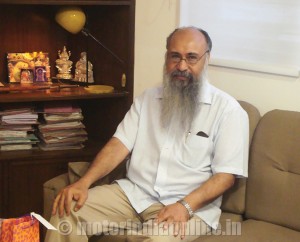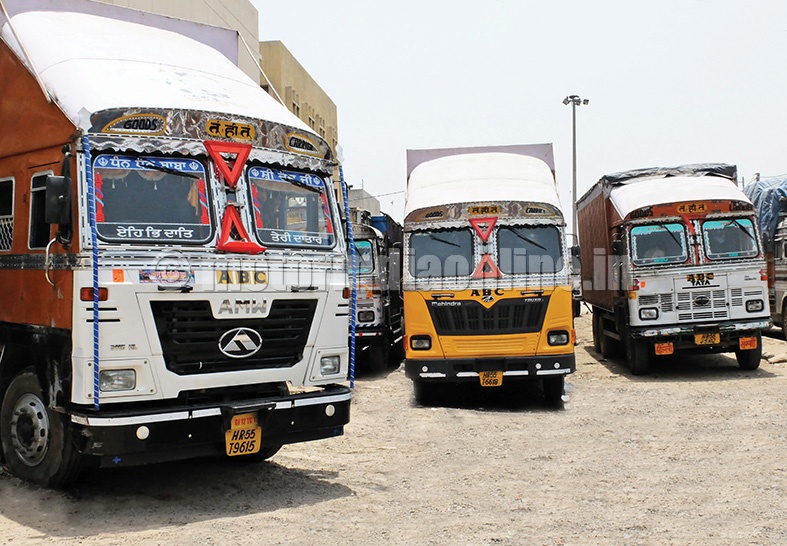ABC Transport Company Pvt. Ltd., one the leading truck operators in Delhi, has now become a well-entrenched player in the load carrying business on the bustling Delhi-Mumbai route. The company which is celebrating its 45+ years of excellence by providing tailor-made solutions to its customers is now drawing up plans to beef up operations by ramping up its fleet size and adding new routes.

Although ABC has adopted a less aggressive in augmenting its topline, it has posted a recurrent growth in its bottomline. The 75-truck fleet operator is also looking at integrating with other players in the country in order to serve the clients who have yet not availed its world class services. Moreover, the upcoming Delhi-Mumbai industrial corridor is expected to provide a huge fillip to its current business model.
In an exclusive interaction with MOTORINDIA, Mr. Inderbir Singh, Managing Director, ABC Transport Company, stated: “Our company was established in 1958 with two trucks by my father, the late Pritpal Singh Chhabra. Ours was the first transport company to have started direct service between Delhi and Mumbai in 1958. Our booking business commenced in 1965. Initially we had 30-35 trucks, and now we have 70-75 which might be ramped up to 100.”
Mr. Singh joined the firm as the second generation entrepreneur in 1978 after completing his B.Com in 1978 from Delhi University. Initially, he was reluctant to join his father’s business as his ambition was to go to the US for higher studies. But he later he changed his mind and inherited his father’s legacy and has added a lot of value to the business.
Mr. Singh, who has the gift of the gab and has always been candid in his words, affirmed: “We have been very restrained in our expansion plans because quality and quantity are difficult to go hand in hand (in our sphere of business). Our focus has primarily been on quality rather than dwelling on quantity. It’s very easy to increase our topline in the goods transport business as it’s a high-freight and high-volume business. But we prefer not to lose track of our bottomlines but concentrate on commanding a premium in our services. In other words, we would like to be cost-efficient rather than clocking sky-high turnovers. To me, overall satisfaction comes from deliverance and not merely from numbers.”
When queried about the USP of ABC Transport’s business, the soft-spoken Mr. Singh highlighted: “I cater to market loads what is called trader’s commodity, which is retail parcel booking and is the interface between wholesalers and traders. I have bookings in Mumbai and Delhi where people come and book their parcels or give me a phone call. We offer quick-fix solution to our customers and are capable of addressing their immediate needs, issues and requirements. We can react faster to our customer problems as we don’t have multiple layers in our management, and anyone can reach me out directly.”
It is to be mentioned here that ABC has products and chassis sourced from multiple OEMs like Bharat Benz, AMW, Tata Motors, Ashok Leyland, Eicher, etc. Going forward, it might also consider holding talks with Scania, MAN and Volvo when the market picks up faster and the economy opens up further. At present, around 150 drivers are on its rolls and a few extra ones are hired on a contract basis. Currently, the company has 75 vehicles with almost all 10 or 12-wheelers. The body type of the vehicle is fixed containers with 50% as 6×2 and 50% as 8×2 configurations. It also hires a bunch of LCVs like Ashok Leyland Dost, Tata Ace and Mahindra Maxximo to collect the goods from multiple traders’ premises.
Talking about its fleet of trucks, Mr. Singh said: “Earlier we had open bodies and it was built by small-time fabricators from Punjab. Since last one decade, we have switched over to the container kind of trucks without compromising on materials and workmanship or cost. Anil Body Maker in Sanjay Gandhi Transport Nagar is one of our long-time partners. Our main loads are parcel booking by traders in Delhi and Mumbai. We ply only closed containers in all our vehicles, so it is mainly dry consumables goods like almond and non-consumables like electrical goods, electronics, medical equipment, auto components and sanitary products. We have the rare distinction of running a well-maintained fleet. Being a small organisation, I take a personal care of them.”
Meanwhile, thw Gujarat-based AMW has become one of its partners in progress as Mr. Singh pointed out: “As a trade responsibility, we thought it is important to encourage OEMs who are working hard and are offering good products. That’s why we keep trying new products like the ones developed by AMW. For the last one year it has been AMW mostly. They have a very good product line-up and have picked up the best components. What definitely gives them an edge over others are: a) all aggregates are already proven in Indian market, b) easy availability of spare parts across India for these trucks, and c) no issues with local mechanics as they are familiar with aggregates even in an unlikely case of breakdown en route Delhi-Mumbai. Their aftersales service is also fantastic.”
However, everything is not smooth sailing for the transport sector as there are multiple challenges that need to be overcome. Mr. Singh asserted: “One of the burning issues is the paucity of trained drivers and there is a complete demand-supply mismatch. Moreover, the NGT ban (on decade-old vehicles run on diesel (in NCR) has complicated the whole process. Rather than the imposition of blanket ban, which is a retrograde step, I suggest there be stringent emission norms and standards and facilities to check this and make amends wherever required. Throwing away a truck is an anti-national act. Maybe we can reconfigure the truck by replacing the old powertrain with a new one.”
He further observed: “The per capita natural resources we are a poor country, and the situation gets worse with economic growth (higher incomes generating higher demand for goods & services, further straining the natural resources). Such gaps can only be filled in by increasing exports of goods & services to pay higher import bills of natural resources. ‘Make in India’ is so apt that we fail to make India the most efficient & proficient factory & service provider; our country is bound to be doomed. Every process should be questioned on its efficiency. Question even a ‘single stroke on the keyboard’ – is it really required?”
Mr. Singh also said that if there are challenges, there are opportunities too that can be explored. “The lifting of the ban on coal mining would open up abundant opportunities for the trucking industry. It’s a gigantic part of our trucking operations. There will be a huge push to the infrastructure sector. The construction of dams, ports, roads and power plants as well as demand for raw material, feedstock and fuel to serve these sectors will also get a huge thrust,” signed off Mr. Singh.
